
 Copyright 2018 by Tara Spencer No part of this publication may be reproduced, stored in a retrieval system or transmitted in any form or by any means, electronic, mechanical, photocopying, recording, scanning or otherwise, except as permitted under Sections 107 or 108 of the 1976 United States Copyright Act, without the prior written permission of the Publisher. Requests to the Publisher for permission should be addressed to the Permissions Department, Rockridge Press, 6005 Shellmound Street, Suite 175, Emeryville, CA 94608. Limit of Liability/Disclaimer of Warranty: The Publisher and the author make no representations or warranties with respect to the accuracy or completeness of the contents of this work and specifically disclaim all warranties, including without limitation warranties of fitness for a particular purpose. No warranty may be created or extended by sales or promotional materials. The advice and strategies contained herein may not be suitable for every situation. This work is sold with the understanding that the publisher is not engaged in rendering medical, legal or other professional advice or services.
Copyright 2018 by Tara Spencer No part of this publication may be reproduced, stored in a retrieval system or transmitted in any form or by any means, electronic, mechanical, photocopying, recording, scanning or otherwise, except as permitted under Sections 107 or 108 of the 1976 United States Copyright Act, without the prior written permission of the Publisher. Requests to the Publisher for permission should be addressed to the Permissions Department, Rockridge Press, 6005 Shellmound Street, Suite 175, Emeryville, CA 94608. Limit of Liability/Disclaimer of Warranty: The Publisher and the author make no representations or warranties with respect to the accuracy or completeness of the contents of this work and specifically disclaim all warranties, including without limitation warranties of fitness for a particular purpose. No warranty may be created or extended by sales or promotional materials. The advice and strategies contained herein may not be suitable for every situation. This work is sold with the understanding that the publisher is not engaged in rendering medical, legal or other professional advice or services.
If professional assistance is required, the services of a competent professional person should be sought. Neither the Publisher nor the author shall be liable for damages arising herefrom. The fact that an individual, organization or website is referred to in this work as a citation and/or potential source of further information does not mean that the author or the Publisher endorses the information the individual, organization or website may provide or recommendations they/it may make. Further, readers should be aware that Internet websites listed in this work may have changed or disappeared between when this work was written and when it is read. For general information on our other products and services or to obtain technical support, please contact our Customer Care Department within the U.S. at (510) 253-0500. at (510) 253-0500.
Rockridge Press publishes its books in a variety of electronic and print formats. Some content that appears in print may not be available in electronic books, and vice versa. TRADEMARKS: Rockridge Press and the Rockridge Press logo are trademarks or registered trademarks of Callisto Media Inc. and/or its affiliates, in the United States and other countries, and may not be used without written permission. All other trademarks are the property of their respective owners. Rockridge Press is not associated with any product or vendor mentioned in this book.
Photography Elysa Weitala, 2018; food styling by Victoria Woollard ISBN: Print 978-1-64152-067-6 | eBook 978-1-64152-068-3 CONTENTS T hroughout my teenage years and early adult life, I was afflicted with various conditions that I simply assumed to be natural, unfortunate burdens of my existence: an irregular menstrual cycle, persistent acne, painful bloating, and a mild resistance to weight loss. After suffering for several years, I finally consulted a doctor and received a diagnosis of polycystic ovarian syndrome (PCOS). PCOS is a common condition that affects about 10 percent of women in Western society, according to the U.S. Department of Health and Human Services. Symptoms vary from woman to woman and include male-pattern hair growth and baldness, depression, and infertility. PCOS itself can never be cured, but the symptoms can be managed.
This syndrome can cause a great deal of confusion and anxiety for many women, as it did with me. I knew that I had to exercise, but I didnt know how often, how long, or even which regimen was the best. I knew that I should eat healthfully, but that term was so broadly used I didnt know exactly what that involved. During my years of experimentation and research about PCOS, I discovered that it can be managed by first overcoming insulin resistance through dietary and lifestyle changes. Not every woman with PCOS is insulin resistant, but about 70 percent are (Traub, 2011). The principles of a diet designed to improve insulin sensitivity can benefit the hormonal production of all women.
It has been almost a decade since I was diagnosed with PCOS. In that time, I have experimented with a variety of dietary elimination and inclusion plans, and holistic treatment methods such as meditation and mindfulness. Ive educated myself on how to manage my symptoms naturally. In turn, Ive nearly eliminated my acne and bloating, and restored my bodys regular menstrual cycle. I also suffer from depression and notice a substantial improvement in my mood when I strictly adhere to an insulin resistance diet. As a personal trainer and nutritionist, Ive shared my newfound wisdom with hundreds of private clients.
Ive also authored two books related to PCOS: The Insulin Resistance Diet for PCOS and The PCOS Diet for the Newly Diagnosed. I thrive on teaching women that its still possible to lead a life filled with vitality and happiness, despite having PCOS. 
 At the time of my own PCOS diagnosis, I led a very busy life. I worked 50 hours per week, exercised 6 days a week, and maintained a full social life. I didnt have the time or energy to spend hours in the kitchen each day following complicated recipes in order to improve my insulin sensitivity and ultimately my PCOS symptoms. I was accustomed to eating convenience foods and was daunted by the idea of preparing all my meals from scratch.
At the time of my own PCOS diagnosis, I led a very busy life. I worked 50 hours per week, exercised 6 days a week, and maintained a full social life. I didnt have the time or energy to spend hours in the kitchen each day following complicated recipes in order to improve my insulin sensitivity and ultimately my PCOS symptoms. I was accustomed to eating convenience foods and was daunted by the idea of preparing all my meals from scratch.
That said, I knew I had to make a concerted effort to improve my health in any way I could. I wish I could have come across this book back then: a treasure trove of recipes for healthy, satisfying meals with familiar flavors that are also super quick and easy to prepare. Every recipe within this book is either a 5-ingredient, 30-minute, one-pot, one-pan, no cook, or bulk cook recipe. The ingredients are natural, wholesome, and cost effective. The book also contains handy recipe labels for those readers who are particularly focused on losing weight, fighting inflammation, or boosting fertility. Readers who are new to healthy eating will benefit from a bonus 2-week meal plan (see ), which includes breakfast, lunch, dinner, and snacks as well as weekly shopping lists.
Every recipe within this book enables you to conquer your insulin resistance and manage your PCOS, using a natural and healthy approach.  Once you understand the basics of an insulin resistance diet and build some momentum, youll see that it is convenient, delicious, and easy to follow. However, it does require some education in the beginning. This chapter explains how insulin resistance is connected to PCOS and how the types of foods we eat affect our hormones. It includes the dietary guidelines for PCOS and specifically describes which foods to eat in abundance and moderation, as well as which foods to avoid altogether. Everything you need to get started with the PCOS diet today is right here! THE ROLE OF INSULIN RESISTANCE IN PCOS As we established earlier, most women with PCOS are insulin resistant.
Once you understand the basics of an insulin resistance diet and build some momentum, youll see that it is convenient, delicious, and easy to follow. However, it does require some education in the beginning. This chapter explains how insulin resistance is connected to PCOS and how the types of foods we eat affect our hormones. It includes the dietary guidelines for PCOS and specifically describes which foods to eat in abundance and moderation, as well as which foods to avoid altogether. Everything you need to get started with the PCOS diet today is right here! THE ROLE OF INSULIN RESISTANCE IN PCOS As we established earlier, most women with PCOS are insulin resistant.
This is by far the easiest symptom to tackle naturally, because it can be kept in check by following the correct diet. Making the necessary diet changes will improve your other symptoms of PCOS, so its important to understand how insulin resistance develops, so we can learn to reverse it.
Next page
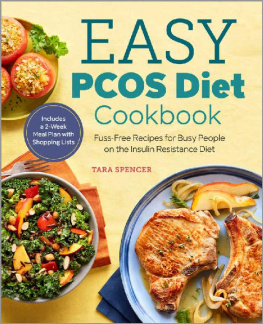

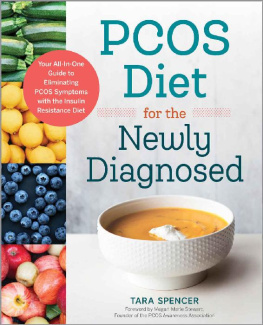


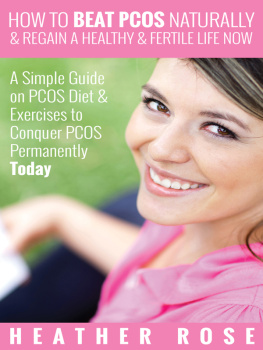
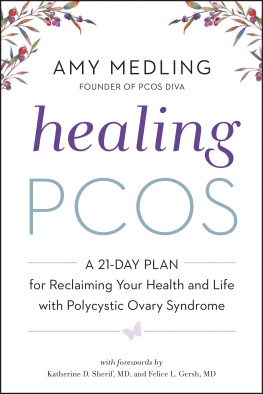
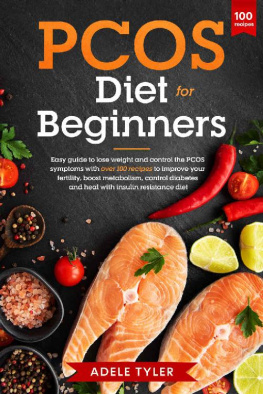
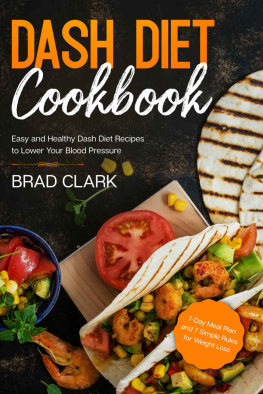

 Copyright 2018 by Tara Spencer No part of this publication may be reproduced, stored in a retrieval system or transmitted in any form or by any means, electronic, mechanical, photocopying, recording, scanning or otherwise, except as permitted under Sections 107 or 108 of the 1976 United States Copyright Act, without the prior written permission of the Publisher. Requests to the Publisher for permission should be addressed to the Permissions Department, Rockridge Press, 6005 Shellmound Street, Suite 175, Emeryville, CA 94608. Limit of Liability/Disclaimer of Warranty: The Publisher and the author make no representations or warranties with respect to the accuracy or completeness of the contents of this work and specifically disclaim all warranties, including without limitation warranties of fitness for a particular purpose. No warranty may be created or extended by sales or promotional materials. The advice and strategies contained herein may not be suitable for every situation. This work is sold with the understanding that the publisher is not engaged in rendering medical, legal or other professional advice or services.
Copyright 2018 by Tara Spencer No part of this publication may be reproduced, stored in a retrieval system or transmitted in any form or by any means, electronic, mechanical, photocopying, recording, scanning or otherwise, except as permitted under Sections 107 or 108 of the 1976 United States Copyright Act, without the prior written permission of the Publisher. Requests to the Publisher for permission should be addressed to the Permissions Department, Rockridge Press, 6005 Shellmound Street, Suite 175, Emeryville, CA 94608. Limit of Liability/Disclaimer of Warranty: The Publisher and the author make no representations or warranties with respect to the accuracy or completeness of the contents of this work and specifically disclaim all warranties, including without limitation warranties of fitness for a particular purpose. No warranty may be created or extended by sales or promotional materials. The advice and strategies contained herein may not be suitable for every situation. This work is sold with the understanding that the publisher is not engaged in rendering medical, legal or other professional advice or services.
 At the time of my own PCOS diagnosis, I led a very busy life. I worked 50 hours per week, exercised 6 days a week, and maintained a full social life. I didnt have the time or energy to spend hours in the kitchen each day following complicated recipes in order to improve my insulin sensitivity and ultimately my PCOS symptoms. I was accustomed to eating convenience foods and was daunted by the idea of preparing all my meals from scratch.
At the time of my own PCOS diagnosis, I led a very busy life. I worked 50 hours per week, exercised 6 days a week, and maintained a full social life. I didnt have the time or energy to spend hours in the kitchen each day following complicated recipes in order to improve my insulin sensitivity and ultimately my PCOS symptoms. I was accustomed to eating convenience foods and was daunted by the idea of preparing all my meals from scratch. Once you understand the basics of an insulin resistance diet and build some momentum, youll see that it is convenient, delicious, and easy to follow. However, it does require some education in the beginning. This chapter explains how insulin resistance is connected to PCOS and how the types of foods we eat affect our hormones. It includes the dietary guidelines for PCOS and specifically describes which foods to eat in abundance and moderation, as well as which foods to avoid altogether. Everything you need to get started with the PCOS diet today is right here! THE ROLE OF INSULIN RESISTANCE IN PCOS As we established earlier, most women with PCOS are insulin resistant.
Once you understand the basics of an insulin resistance diet and build some momentum, youll see that it is convenient, delicious, and easy to follow. However, it does require some education in the beginning. This chapter explains how insulin resistance is connected to PCOS and how the types of foods we eat affect our hormones. It includes the dietary guidelines for PCOS and specifically describes which foods to eat in abundance and moderation, as well as which foods to avoid altogether. Everything you need to get started with the PCOS diet today is right here! THE ROLE OF INSULIN RESISTANCE IN PCOS As we established earlier, most women with PCOS are insulin resistant.